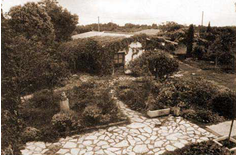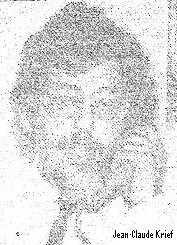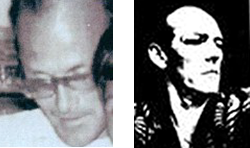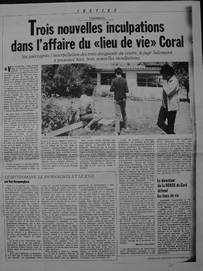HOME |
||||
| Organe de presse | ||||
| HOME | ||||
| Droit Fondamental |
|
|
|||||||||||||||||||||||||||||||||
|
||||||||||||||||||||||||||||||||||
 Zandvoort - Coral
Zandvoort - CoralThe Coral became famous in 1977, when writers made novels about their loves with "agreeing children". It rhymed in bombastic language, as if it could wipe out their crimes. Il acted of a "lieu de vie" (living place) for psychotic and autistic children. It belonged to a movement aiming at making recognize "the right to the difference, the tenderness and the caresses" of dirty old pigs in erection to children. It acted of a "philosophical debate" and the "sexual freedom" of the emotionally handicapped children and part of a "new therapy".
Two young patients would have been left alone at the Coral, while those responsible of them would have brought the others in a village party. The youngest, aged eleven, was found dead, head drowned in a water bucket. His autopsy showed he had been sodomized. The oldest was judged guilty but irresponsible and locked in psychiatry. He would have tried to cure his friend in this manner. No one explained why autistic and psychotic children were left alone, without any one to look after them.

In 1992, Jean-Claude Krief met Willy Marceau, a poet and child procurer. They were both aged 21. Marceau will make Krief discover the Coral at Aymargues, a lovely little village in the south of France. The password to enter there was to have read "Obviously, I love you" of Claude Sigala, a film maker and founder of the Coral.
Jean-Claude Krief had spent his childhood in institutions, due to health problems of his parents. He had kept very bad memories of "obvious love" he had been to impose on agreeing. He passed the test of the book and infiltrated the place as a teacher for the handicapped children.
He saw a procession of the international Paedo-Socialist. The young patients were taken cared of by ministers in place or to become and band of perverse dandies, who would abuse these children, assured their silence. He discovered a suitcase full of child pornography, of which that of a managing director of the Coral: a French magistrate, trousers down, abusing the unfortunate Nordine, aged 11 years old and who will never speak, if he is still alive.
Jean-Claude Krief denounced the case. Three children of the Coral had declared to the detectives they had been sodomized and one of the Coral directors, Jean-Noël Bardy, had admitted to have had "therapeutic sexual activities". Three hundred and forty three warrants for arrest were launched on people who used to go to the Coral, apparently more to soothe their sexual perversities, rather than to observe handicapped children. Among them, Sigala, Marceau, as well as the novelists Matzneff and Schérer of the movement of Tony Duvert, a journalist for the paedophile magazine "Gay Pied". Three years earlier, the philosophers had testified in court that Jacques Dugué had not abused children, but that they had shared agreed to sexual affairs.
 |
 |
Matzneff
& Scherrer: the paedo-philosophers |
|
Captain Barril of the Gendarmerie had received instruction to stop the inquiry in reason of the number of personalities: ministers, magistrates, journalists, even a chief editor and a columnist of the newspaper Le Monde, etc. The file ended up in the garage of the main investigator's boss, together with the Kripten file, a satanic and paedophile sect allied to Belgium.
Michel Krief, brother of Jean-Claude, will be found dead. All believed in a murder, except the police that declared it was a suicide. A false official report with a signature looking as that of Jean-Claude Krief, blamed the writer Schérer and the Minister Lang of child abuse. Trap or false signature? No one knows, Krief but the main witness was imprisoned with Sigalla. He was then invited to admit in writing having invented every thing by "love vexation" for Sigalla, with a bombastic style and a spelling that does not belong to him, after three "suicide attempt".
The judge Salzmann closed the inquiry with a few symbolic sentences, though the consents of one of the directors and the outraged cries of the philosophers asking the liberation of paedophilia. They were "crime of opinion victims", according to them.
Jean-Claude Krief was accused of being a pathologic liar. He will all the same rush to bring his file to the lawyer Baduel, who defended a victim of the Kripten network. Willy Marceau, charged in the Coral case, was one of those who had prostituted his client.
Kripten was linked by its members to the CRIES network, established in the Brussels building of UNICEF. Baduel will introduce a file for the defence of the mackerel of his client, assuring he was also a victim of the network, for having denounced his competitors.
Those who have passed by these networks as children are in such a state, that there is nothing to fear from them.
In 1998, sixteen years after the scandal, the Belgian association Werkgroep Morkhoven was on the traces of the Zandvoort network for ten years. The activists had managed to lay hands on their archives and brought them to the police. They inquired on the photograph n°9, which represents a man and child holding each other's penis. As he visited a Swiss organisation, Marcel Vervloesem, head investigator of the group, discovered the Baduel file and the photograph Jean-Claude Krief said to be of the magistrate.
Judge Salzmann had instructed several cases linked to the Zandvoort file with the same clumsiness:
Jacques Dugué had been condemned to symbolic sentences, until thirty years later, when he abused and photographed the children of his first victims. He will admit to be one of the Zandvoort child pornography procurers.
Cécile Bloch, murdered at the age of eleven and whose photograph was also found in the Zandvoort file, was also lead by Salzmann and still tramples. Yet Marcel Vervloesem, the man who has brought the Zandvoort file to justice, will be condemned for intruding in the private life of the child murdered twenty years earlier, following the complaint of her father who had recognised her on a Dutch website aiming at the identification of the victims!
In the archives of Zandvoort, a coded list of members, which have the particularity to name a series of criminals condemned or linked to the case:
 |
|
Le
magistrat |
Marcel
Danze |
(Role
over picture for evidence for +18yrs only) |
|
It will take two years for the Belgian authorities to communicate the photograph N°9 to the other police services. But it won't take 2 hours to Inspector Zicot to answer that the adult on photograph N°9 would act of Marcel Danze, a video club owner who was well-known in the local prostitution of Charleroi.
Scotland Yard is positive: Danze is not the man of photograph n°9, what for most, is obvious at first sight. The baldness’s of the two men have different roots. One needs spectacles, the other don't. One looks like a magistrate, the other as a scoundrel.
Inspector Zicot was accused of forgery in writing and swindling in the framework of the Dutroux network. Specialist in car stealing, he had intervened several times in favour of the Marc Dutroux band. He was accused of having directed suspicions of fraud to insurance towards his enemies in the service whereas he had received information mentioning Dutroux, to have forgotten to inform his hierarchy of important facts for the course of the Dutroux investigations and to have protected the one indicated "to have evacuated" the car in which Julie and Melissa were kidnapped.
He never had to answer of having hastened to try clearing the magistrate. Member of the former Criminal Investigation Department of Charleroi, he was promoted from the provincial police quarters to chief police of the federal police of Brussels, as a respect for his presumption of innocence, then cleared of all the charges that weighed on him... by lack of elements.
The lawyer Baduel will say that Jean-Claude Krief had died of natural death, carrying with him the secrecy of his file and that his brother had taken refuge in a kibbutz in Israel. At the opposite, the supporting committee of the magistrate ensures that the Krief brothers would have been special agents of the French secret services who would, with the help of the drugs and procurers brigade, have made a setup to bother an honest magistrate who fights paedophilia.
To resume this supporting committee version : Jean-Claude Krief would have confused the institute for psychotic and autistic children with the headquarters of the socialist party and the secret services would have paid him to buy child pornography in Belgian and Dutch sex shops. He and his brother would have joined the socialist party and the "autonomous", a bunch of violent Communists, to spy on some and manipulate others. It would have carried out not to the natural death of Jean-Claude, but to the suicide of Michel, in the middle of the scandal. The secret service, they suspect of having murdered Michel, would have then paid Jean-Claude a plane ticket to hide in Israel. Nothing very logical.
On another hand, the tragic death of Jean-Claude's brother was likely to lead all the Krief family in a collective suicide, what might have incited him to retract his charges.
On will noted that its was not the officers of the secret services, nor the boiling young Communists who had let themselves photographed naked while abusing children, but a judge of youth linked to the most pompous of the French government and magistrates. His supporting committee is scandalized by the denunciation of this man which no one dares to name, in fear of seeing his family committing suicide and ending in prison.
 J U S T I C E
J U S T I C E
TENDRESSE
Libération - le 20 octobre 1982
Vous comprenez, nous sommes dans un domaine extrêmement difficile. On accuse des gens de faits que l'on qualifie d'attentats à la pudeur et que les intéressés revendiquent comme des actes de tendresse. Me Jean-Jacques de Félice, un avocat désigné dans l'affaire du Coral, ne trouvait pas d'autres mots pour commenter le dossier d'interrogatoires sur lequel s'est fondé le juge Salzmann pour faire écrouer lundi soir le directeur du "lieu de vie", Claude Sigala et deux de ses collaborateurs, Alain Chiapello et Jean-Noël Bardi. "Mes clients protestent avec vigueur leur innocence et se disent victimes d'une campagne de presse, a ajouté Me de Félice, pour qui cette affaire relève presque "du débat philosophique".
Six jours après l'interpellation des trois dirigeants du Coral, il est toujours impossible de savoir les faits qui ont conduit à leur inculpation pour "attentats à la pudeur sans violence sur mineur de moins de 15 ans et excitation à la débauche". Certes, on évoque les auditions des trois enfants, anciens pensionnaires du Coral qui auraient déclarés aux enquêteurs avoir été l'objet d'attouchements et de sodomisations dans ce "lieux de vie". Mais pour Me de Félice, ces témoignages doivent être pris avec la même prudence et ce, même si l'un des trois inculpés, Jean-Noël Bardy, a reconnu devant les enquêteurs avoir participé a des "activités sexuelles" en précisant que "cette liberté sexuelle faisait partie d'une thérapeutique nouvelle".
Enfin, on parle d'un dernier élément retenu contre Sigala: on l'accuse d'avoir accepter le retour au Coral d'un ancien stagiaire, auteur en 1977 d'un meurtre précédé d'un viol sur un enfant de 11 ans. Jugé à l'époque "irresponsable" par les psychiatres, le jeune homme mineur au moment des faits, avait été interné en psychiatrie. Récemment, il serait revenu au Coral ou des mineurs se sont plaints de son comportement. Disparu depuis quelques semaines, il fait aujourd'hui l'objet d'un avis de recherche à la demande du juge d'instruction.
|
Bref, toutes choses estimées suffisamment graves par le juge Salzmann pour justifier la détention des trois intéressés. Détention que le parquet avait également souhaité pour Claude Sigala et Jean-Noël Bardy, mais avait exclu Alain Chiapello. Pour ce dernier, le parquet avait estimé suffisant une inculpation avec mise sous contrôle judiciaire. Il n'a pas été suivi par le juge Salzmann, lequel n'est, semble-t-il, pas prêt à s'en tenir là.
Lundi 18 octobre, il ordonnait notamment aux policier de la BSP, une perquisition chez René Scherrer, professeur de philosophie à l'université de Paris XIII, perquisition suivie d'un très long interrogatoire et d'une garde à vue qui s'est achevé mardi après-midi par l'inculpation de René Schérer pour excitation de mineur à la débauche. Accusé par l'unique dénonciateur de l'affaire, Jean-Claude Krief, d'avoir commis des "actes contre-nature" en sa présence, René Schérer a été innocenté lors d'une confrontation qui a eut lieu lors des interrogatoires. S'il est néanmoins inculpé, c'est comme lui a expliqué le juge Salzmann, "pour rester à la disposition de la justice".
Dans le cadre de cette même mission rogatoire, le juge Salzmann avait déjà la semaine dernière, fait effectuer une perquisition au siège de la revue des lieux de vie "Possible". Placé lui aussi en garde à vue, le directeur de la revue Roger Aufman fut longuement interrogé sur le fonctionnement du Coral où il s'était rendu en février dernier à l'occasion des "états généraux sur les lieux de vie." Après plus de 48 heures, Roger Aufman fut libéré sans inculpation. Hier, il a déposé une plainte auprès du doyen des juges de Paris pour "vol de fichiers". Au cour de la perquisition dans les locaux de sa revue, les policiers ont en effet saisit la totalité du fichier des abonnés. Certains on d'ailleurs à leur tour porté plainte pour "attentat à la liberté individuelle". Leur avocat a également alerté la commission nationale informatique et liberté, chargée de la protection des fichiers.
Les dénonciations de Jean-Claude
Krief continuent à inspirer le juge Salzmann a en effet
inculpé Willy Marceau, 21 ans, sans profession et Gérard
Durant, 37 ans, professeur de flûte à bec. Le
motif de l'inculpation est toujours le même: "attentats
à la pudeur sans violence sur mineur de moins de 15
ans et excitation à la débauche". Willy
Marceau a été laissé en liberté
sous contrôle judiciaire et Gérard Durant a été
placé sous mandat de dépôt à la
prison de la santé. On ne savait pas plus hier sur
les raisons de leur inculpation ni sur les liens qu'ils ont
pu avoir avec l'équipe du Coral.
Le directeur de la DDASS défend les lieux de vie.
Apprenant l'inculpation des trois responsables du Coral, le directeur de la DDASS du Gard, Bernard Abeil, s'est déclaré "indigné" par "le manque d'objectivité" de certains journaux. "Des contrôle ont bien été effectué, a-t-il précisé, les rapports avait mis l'accent sur un problème d'hygiène douteuse au Coral. Ajoutant que "s'il avaient eut vent d'une action pédophile, il aurait tout de suite engagé une action judiciaire". Face au principe même de ces "lieux de vie", le directeur de la DDASS du Gard a déclaré qu’ils pouvaient constituer une réponse face à certain cas douloureux d'enfants psychotiques. Quand les enfants atteignent les 16 ans, ils quittent les centre agréés et la seule alternative est de les renvoyés en hôpital psychiatrique. Les lieux de vie offrent une réponse face à l'éventail des placements.
Béatrice Vallaeys
Editeur responsable: Fondation Princesses de Croÿ et Massimo Lancellotti - 10 Rue Faider - 1060 Bruxelles - Belgique - Droit de réponse: postmaster@droitfondamental.eu